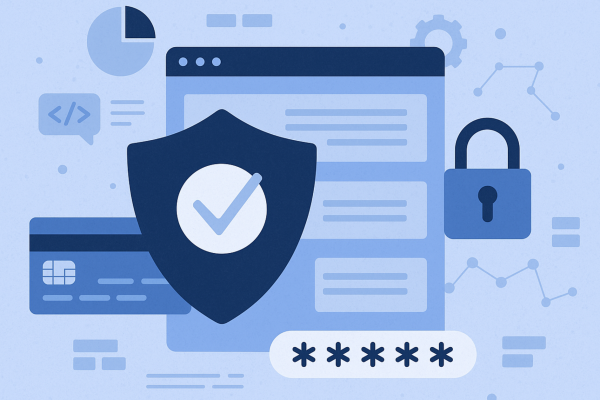How Does Encryption Help with PCI DSS Compliance?
In today’s digital landscape, ensuring the security of payment data is crucial for any business handling credit card information. One of the key elements to achieving this is through PCI DSS compliance. For organizations seeking to meet PCI DSS standards, utilizing a PCI DSS compliance service in Mohali can be immensely beneficial. Among the various methods to secure payment data, encryption stands out as a fundamental practice. This blog will explore how encryption helps with PCI DSS compliance, providing a detailed look at its role and benefits
What is PCI DSS?
The Payment Card Industry Data Security Standard (PCI DSS) is a collection of security guidelines aimed at safeguarding card information both during and after a financial transaction. These standards are created and maintained by the PCI Security Standards Council (PCI SSC). The primary goal of PCI DSS is to prevent data breaches and ensure that sensitive payment information, such as credit card numbers and personal identification details, remains secure.
What is Encryption?
Encryption is a process that converts plaintext data into a coded format, making it unreadable without the proper decryption key. It is a critical component of data security, as it protects sensitive information from unauthorized access. When data is encrypted, it can only be deciphered and understood by someone who has the correct decryption key, thereby safeguarding it against potential breaches.
How Encryption Supports PCI DSS Compliance
Encryption plays a pivotal role in helping organizations meet PCI DSS requirements. Here’s a detailed look at how it supports compliance:
1. Protecting Cardholder Data
One of the primary requirements of PCI DSS is to protect cardholder data, both in transit and at rest. Encryption ensures that cardholder data is secured during transmission across networks and while stored on systems. For example, when credit card information is transmitted over the internet, encryption protocols such as TLS (Transport Layer Security) protect it from being intercepted by malicious actors.
2. Securing Data During Transmission
Encryption protects data as it travels across networks. This is crucial for preventing data breaches during online transactions or when transferring data between systems. PCI DSS mandates the use of strong encryption protocols to secure data in transit. Encryption algorithms like AES (Advanced Encryption Standard) are commonly used to ensure that data is transmitted securely.
3. Protecting Stored Data
PCI DSS also requires that sensitive payment information stored on servers or databases is encrypted. This means that even if an attacker gains access to the storage system, they will only find encrypted data, which is useless without the decryption key. Encryption of stored cardholder data helps mitigate the risk of data breaches and ensures that even compromised data remains protected.
4. Encryption Key Management
Effective key management is a critical aspect of encryption. PCI DSS requires organizations to implement robust key management practices to ensure that encryption keys are protected and managed securely. This includes generating, storing, distributing, and disposing of keys in a controlled manner. Proper key management ensures that encryption remains effective and that unauthorized access is prevented.
5. Compliance with Specific PCI DSS Requirements
PCI DSS outlines specific requirements for encryption, including:
- Requirement 3: Protect Stored Cardholder Data – This requirement mandates that cardholder data be encrypted when stored. Organizations must use strong encryption methods to protect data at rest.
- Requirement 4: Encrypt Transmission of Cardholder Data Across Open and Public Networks – This requirement specifies the use of encryption to secure cardholder data during transmission across public networks.
- Requirement 8: Identify and Authenticate Access to System Components – While this requirement focuses on access control, encryption plays a role in ensuring that sensitive data is protected from unauthorized access.
Benefits of Encryption for PCI DSS Compliance
Implementing encryption provides several benefits for organizations seeking PCI DSS compliance:
- Enhanced Data Security
Encryption adds an extra layer of security to sensitive payment data, making it more challenging for attackers to access and exploit. This enhanced security helps protect cardholder information and reduces the risk of data breaches. - Reduced Risk of Data Breaches
By encrypting cardholder data, organizations can significantly reduce the risk of data breaches. Even if data is stolen or accessed by unauthorized individuals, encrypted data remains secure and cannot be easily deciphered without the decryption key. - Increased Trust and Credibility
Compliance with PCI DSS and the use of encryption demonstrate a commitment to data security. This can enhance an organization’s reputation and build trust with customers, who are increasingly concerned about the protection of their payment information. - Simplified Compliance Audits
Encryption helps simplify the compliance audit process by providing clear evidence of data protection measures. Auditors can verify that encryption protocols are in place and functioning correctly, making it easier to achieve and maintain PCI DSS compliance. - Compliance with Legal and Regulatory Requirements
In addition to PCI DSS, encryption helps organizations comply with various legal and regulatory requirements related to data protection. Encryption is often required by data protection laws and regulations, further emphasizing its importance in maintaining compliance.
Challenges and Considerations
While encryption is a powerful tool for PCI DSS compliance, there are some challenges and considerations to keep in mind:
- Performance Impact
Encryption can have an impact on system performance, particularly when encrypting and decrypting large volumes of data. Organizations need to balance security with performance and ensure that encryption does not significantly affect user experience or system efficiency. - Key Management Complexity
Effective key management is crucial for maintaining encryption effectiveness. Organizations must implement secure key management practices and ensure that encryption keys are protected against unauthorized access. - Compliance with Evolving Standards
Encryption standards and best practices evolve over time. Organizations need to stay updated with the latest encryption standards and ensure that their encryption practices remain compliant with current PCI DSS requirements.
Conclusion
Encryption is a fundamental component of PCI DSS compliance, providing robust protection for cardholder data both in transit and at rest. By leveraging encryption, organizations can safeguard sensitive payment information, reduce the risk of data breaches, and demonstrate a commitment to data security. A PCI DSS compliance service can assist organizations in implementing effective encryption strategies and ensuring adherence to PCI DSS requirements. As the digital landscape continues to evolve, encryption will remain a vital tool in protecting payment data and achieving compliance with industry standards.
Author







